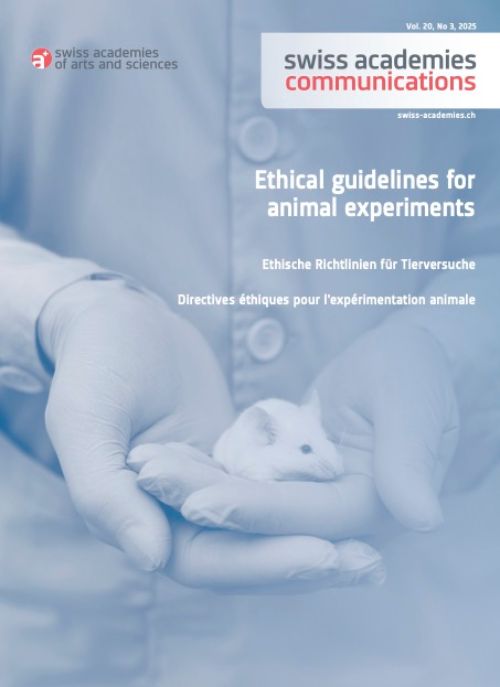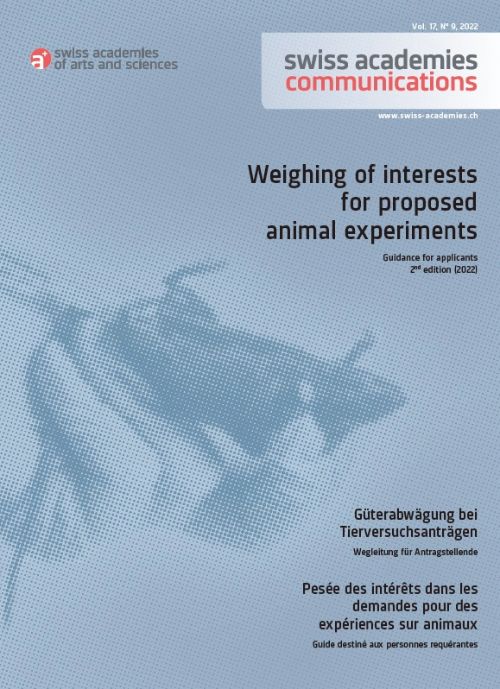Animal experimentation is an essential component of fundamental biological research and research for the protection of the life and health of human beings and animals, for the conservation of biodiversity and nature. The applicable Swiss legislation is among the strictest in the world, and current enforcement practice promotes the conduct of ethically responsible research.
In various fields of scientific research, animal experimentation makes a vital contribution to our understanding of fundamental biological processes, to the development of therapeutic approaches for human and animal diseases, and to protection of the natural environment. Animal experiments in Switzerland are subject to the requirements of Swiss animal welfare legislation and must thus be limited to the indispensable minimum.
For each individual animal experiment, indispensability is assessed in advance in a consideration of proportionateness. Here, it is examined whether the animal experiment is suitable, necessary and appropriate. This requires, inter alia, that the criteria of good research practice are complied with, and that the 3Rs principle (replacement, reduction, refinement) is observed. Finally, based on the weighing of interests, it is determined whether the anticipated benefits of the animal experiment outweigh the expected strains imposed on the animals.
The SAMS seeks to ensure that animal experiments are conducted in accordance with the highest standards of good research practice and in an ethically responsible manner. Together with its sister academy SCNAT, it operates the Ethics Committee for Animal Experimentation (ECAE).
Ethics Committee for Animal Experimentation (ECAE)
The Ethics Committee for Animal Experimentation (ECAE) acts as an expert and advisory body in the area of animal experimentation. It anticipates and discusses ethical challenges arising from research involving animals, with the aim of promoting high-quality, responsible and scientifically robust research. Its members are drawn from the fields of biomedical research (including basic scientific research), veterinary medicine, animal welfare, law and (animal) ethics.
Ethics Committee for Animal Experimentation (ECAE)
Publications
Ethical guidelines for animal experiments
The Swiss Animal Welfare Act permits the use of animals for certain scientific purposes; at the same time, however, it requires that the dignity of animals be respected and their welfare protected. For researchers, reconciling these various societal interests can be challenging. The revised ethical guidelines are designed to clarify the margin of discretion left by the legislation and to encourage researchers to reflect on the handling of animals in their experiments.
A revised edition of the guidelines was published in june 2025. The ethical guidelines are primarily addressed to researchers and all other persons involved in research. In addition, for other animal research stakeholders, the guidelines provide information as to the considerations on which researchers’ decisions are based when dealing with laboratory animals.
The previous document from 2005 (pdf, available in French or German) and the explanatory report on the revision (pdf) remain available here.
Weighing of interests for proposed animal experiments
Under the Animal Welfare Act, animal experiments can only be licensed in Switzerland if they have undergone a formal procedure involving both scientific and ethical considerations. This takes the form of a weighing of interests – a demanding, multi-step process whereby the suitability, necessity and appropriateness of each animal experiment is assessed. The ECAE has developed guidance which explains the principle of the weighing of interests and how it is to be carried out in practice.
A revised edition of the guidance was published in 2022. It is addressed not only to researchers submitting applications, but also to animal welfare officers, members of cantonal animal experimentation committees and licensing authorities responsible for reviewing applications.
In 2010, the ECAE published preliminary considerations on the concept of animal dignity and the weighing of interests.
Authorisation procedures for animal experiments
In response to political initiatives on the restriction of animal experiments and the tightening of licensing requirements, Professor Hanno Würbel, Head of the Animal Welfare Division at the University of Bern, explains in the SAMS Bulletin 2/2019 why strict licensing procedures are important for the legitimacy of animal experiments, and how such procedures could be more effectively and efficiently implemented.
SAMS Bulletin 2/2019: Licensing procedures for animal experiments: stricter controls or greater individual responsibility? (2019) available in French or German
Animal welfare during the pandemic
The breeding and care of laboratory animals and the conduct of animal experiments was affected by the partial lockdown of spring 2020. As a result of deficiencies in the formulation and implementation of emergency plans, there was a risk that animal welfare would not be sufficiently taken into account. Against this background, the ECAE prepared a position paper outlining the problem from an ethical perspective and offering suggestions for future situations. The paper was not based on systematic data collection, and the provision of robust data on this topic would be welcomed by the ECAE.
Position paper: Handling of laboratory animals during the Covid-19 pandemic (2 December 2020) available in French or German
The SCNAT web portal «Animal experimentation explained»
Science is just one element among many in the societal debate on the acceptability and regulation of animal experiments. The SAMS wishes to promote discussion of this topic from a wide variety of perspectives. The web portal of the Swiss Academy of Sciences (SCNAT) provides a forum where researchers from the Swiss Laboratory Animal Science Association (SGV) give answers to frequently asked questions on animal experiments in Switzerland.
STAAR Commission
In 2022, the STAAR Commission – Swiss Transparency Agreement on Animal Research – was created by swissuniversities to provide support for organisations which carry out or fund animal research in their communication with the public. Members of STAAR are committed to open and transparent communication on animal research and explanation of their reasons for supporting it. STAAR brings together both public and private organisations, including the Swiss Academies, which are represented by the ECAE Chair, Professor Hanno Würbel. As stated in the STAAR Declaration, the Swiss Academies of Arts and Sciences are committed to transparent dialogue on animal experimentation.
Politics
No to the popular initiative for a future without animal testing
The popular initiative for a future without animal testing was submitted on 11 November 2024. On the same day, swissuniversities, the umbrella organisation of the Swiss universities, published a press release with arguments against this initiative. A comprehensive ban on animal testing in Switzerland would have serious consequences for numerous areas of research and would significantly hamper progress, innovation and education in human and veterinary medicine, as well as other scientific disciplines. Switzerland has one of the strictest animal protection laws in the world, which ensures that animal experiments are carried out under responsible and ethical conditions. Like swissuniversities, the SAMS considers the initiative to be the wrong approach and rejects it. The arguments can be found in the swissuniversities press release of 11 November 2024 in French or German.
Popular initiative: Ban on experiments on animals and humans
In February 2022, the popular initiative for a ban on animal and human experimentation was decisively rejected (79% against). Approval of the initiative would have jeopardised progress in research and medicine, scientific training, and healthcare in Switzerland. The SAMS had therefore strongly recommended rejection of the initiative. The argumentation can be found in the SAMS Newsletter of 10 January 2022 available in French or German.
Parliamentary initiative: Prohibition of heavy-burden animal experiments
Ahead of the discussion of Maya Graf’s parliamentary initiative 18.491 “Prohibition of experiments imposing severe burdens on animals” in the Science, Education and Culture Committees of the National Council (SECC-N), argumentation was drawn up by the Swiss Academies of Arts and Sciences, swissuniversities and the Swiss National Science Foundation (SNSF).
The advisory committee’s decision is available in French or German.
Argumentation regarding the parliamentary initiative 18.491 (2019) is available in French or German.
Events
Authorisation procedures for animal experiments
In autumn 2021, the ECAE organised a national Roundtable on the authorization procedure for animal experiments. Experts from the fields of research, animal welfare and ethics, as well as representatives of cantonal and federal authorities exchanged their different views on current problems and possible reforms of the authorization procedure for animal experiments. Key findings from the meeting are summarised in an article published in the SAMS Bulletin 1/2022 (p. 6, available in French or German).
Based on the learnings from the first round table in 2021, the ECAE has drafted a discussion paper that summarizes the weaknesses of the current implementation practice and outlines possible reforms of the authorization procedure for animal experiments. The aim of the paper is to initiate an in-depth discussion on possible reforms among all involved stakeholders.
The ECAE is organising a second Roundtable on this topic in November 2025. The paper serves as a basis for discussing proposals for possible reforms and evaluating them for potential consensus with representatives of the different stakeholders.
The Discussion paper «Possible reforms of the authorisation procedure for animal experiments in Switzerland» is available in French and in German, the executive summary is also available in English.
Monkey, Mouse or Zebrafish? Considerations in choosing model organisms»
On what considerations do researchers base their choice of model organisms for their studies? How do they deal with the implicit moral hierarchy among animals, with primates at the top and fish at the bottom? Scientific and ethical questions concerning the choice of model organisms were discussed at a symposium held on 1 July 2021. The aim was to raise awareness of these issues among researchers, animal welfare officers and licensing authorities. In order to address questions as concretely as possible, the topic of the symposium was discussed with reference to a specific research field – Alzheimer’s disease. The results are summarised in the symposium report.

